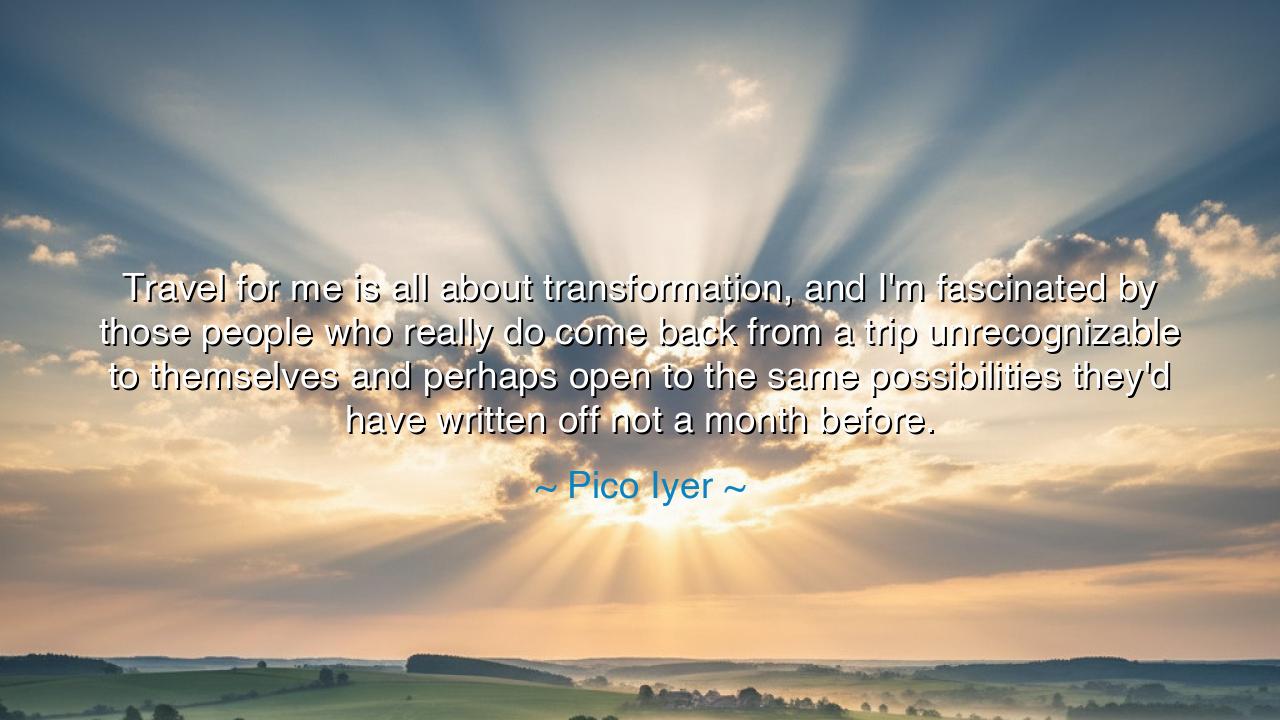
Travel for me is all about transformation, and I'm fascinated by
Travel for me is all about transformation, and I'm fascinated by those people who really do come back from a trip unrecognizable to themselves and perhaps open to the same possibilities they'd have written off not a month before.






Pico Iyer, the pilgrim of the modern age, speaks a truth both timeless and profound when he declares: “Travel for me is all about transformation, and I’m fascinated by those who return from a journey unrecognizable to themselves, open to possibilities they once dismissed.” In this saying, we hear the voice of one who knows that a journey is more than the moving of the body across the earth—it is the movement of the soul into new light. The roads we walk are not merely paved with stone; they are paved with awakening.
The meaning is clear: true travel is not for idle leisure alone, nor merely for the collection of sights as one collects coins. It is a sacred fire in which the self is melted and remade. To step into a foreign land is to step outside the prison of habit. The foods, the faces, the faiths—each unsettles the narrow walls we built around ourselves. Thus, when we return, if we have traveled rightly, we are no longer the same. We are, as Iyer says, almost unrecognizable to ourselves, strangers who have met a larger truth.
Consider the young Siddhartha, who left his palace walls in India and journeyed into the world. What began as curiosity became the path to enlightenment. He saw sickness, he saw death, he saw poverty, and these revelations shattered the illusions of his sheltered life. His travel through the villages of suffering transformed him, until the prince was no more, and the Buddha was born. This is the power of the road when walked with open eyes: it makes of us something greater than we were, unrecognizable even to our former selves.
History, too, gives us the tale of Marco Polo. He departed Venice as the son of a merchant, but returned decades later with tales so wondrous they seemed impossible. He was transformed not only in knowledge but in vision. He saw the East not as rumor but as reality, and his words stretched the imagination of Europe beyond its borders. He, too, became proof that to truly travel is to be forever changed.
Yet Iyer’s wisdom carries also a warning: not all who wander are transformed. Many return as they left, because they did not allow the journey to enter their hearts. To travel rightly requires humility, the willingness to be broken open, the courage to abandon certainty. Only then can the old self be cast off, and the new self step forth into the dawn of possibility. Without this openness, the road is nothing more than scenery passing by.
The teaching for us is this: seek not only distance in your travel, but depth. Let the world unsettle you; let its strangeness question your ways; let its beauty wound and heal you. And when you return, do not cling to the person you were. Allow yourself to be new. For in this rebirth lies the secret gift of the journey.
Practical counsel follows: when you travel, do not only take photographs—take silence, reflection, and courage with you. Speak with strangers, taste what you have never tasted, listen without judgment. Write down your thoughts before and after, and see how your soul has shifted. And when you come home, honor that transformation: act on the possibilities you once dismissed, live as the self you have become. For the purpose of the road is not to escape life, but to return to it reborn.
Thus, the lesson is eternal: travel is not flight, but transformation. The one who walks far with open eyes does not merely cross borders—he crosses into a greater self. And that self, awakened, is capable of seeing not only new lands, but new horizons within the heart.






AAdministratorAdministrator
Welcome, honored guests. Please leave a comment, we will respond soon